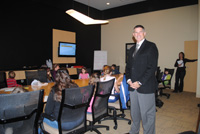Editorial
Front Page - Friday, December 3, 2010
WTCI’s effect extends with educational, community storytelling
Erica Tuggle
 Paul Grove, the President and CEO of WTCI and PBS of Chattanooga, says that they take very seriously their role as a storyteller and educator for the community with their programming. WTCI has the ability to reach 850,000 people a week from every income and social level out there and offers over 60 hours of children’s educational programming every week.
- Erica Tuggle
Paul Grove, the President and CEO of WTCI and PBS of Chattanooga, says that they take very seriously their role as a storyteller and educator for the community with their programming. WTCI has the ability to reach 850,000 people a week from every income and social level out there and offers over 60 hours of children’s educational programming every week.
- Erica Tuggle
Paul Grove, the president of WTCI, says when he was in commercial television, he was disillusioned about some programs for their lack of inspiration or educational value.
Now with PBS and WTCI, Grove feels proud to say he works in a place where family values are on the forefront and their mission as the community’s storyteller and educator is something everyone can get behind.
“I easily know when people go on our channel they are not going to see something that is dumbing-down America. They will see something inspirational and educational at all times; it’s going to be of some value and make the community a better place,” he says.
Grove attended the University of Florida for broadcast journalism and hoped to become the next voice of one of the sports teams he loved and grew up with, but he soon decided his place was behind the camera, where he enjoyed the writing and creative element of the business.
He became a producer and first began his involvement with PBS with a show about the 1994 World Cup titled, “It’s a Kick.” He took a job at the Tampa, Fl., PBS station, and after 10 years in commercial television and 15 plus years at PBS, he was offered the Chattanooga CEO position.
Grove says his job is to build relationships for the station to engage into the community with those who can help WTCI be a station everyone is proud of. WTCI does this by documenting the history of the community through their television programs and now increasingly in interactive online programming.
One of these programs is a documentary called “Untamed Legacy: America’s Wild Mus-tang,” which started from the inspiration of one Chattanoogan and his love for mustangs and expands to the national challenge of the danger mustangs face across the nation.
“It will be a production that we distribute nationally to PBS stations all across America but it will have a great piece about Chattanooga and will be a way for us to share Chattanooga’s story with the rest of the nation,” Grove says. “One of our things we focus on is how to tell Chattanooga’s story to the rest of America and produce it in a way that it will be interesting to everyone else so it’s not just a Chamber of Commerce video.”
Another one of their nationally watched documentaries is “Tracing the Tracks,” a look at the mythical Chattanooga Choo-Choo, its 100 year history and the song that started it all.
“Not every PBS station has things like this, but we produce national quality productions that are now in 38 states,” he says.
The induction of online programming into WTCI is another part of being interactively connected with the community in having a way for viewers to watch programs anytime they want and talk to producers and hosts with questions, comments and what they want out of their shows.
“That’s what a PBS station is all about,” Grove says. “We are trying to produce programming that makes our community interested in itself and make our place a better place to live.”
This has been used to a great effect with the “Untamed Legacy” documentary in thatviewers from all over have visited the Web site links on how to adopt a mustang and called WTCI looking for information on how to help.
It’s obvious by now that PBS is much more than the children’s programming that they are known for, but at the same time, Grove says their role as an educator with these programs is something they take very seriously.
“We believe PBS WTCI is the best dollar spent for education,” he says. “We say that because we have the ability to reach 850,000 people a week. We have over 60 hours of children’s educational programming every week.
“Only about 60 to 70 percent of the area we cover has pay television, so there’s a good 30 to 40 percent that just have broadcast television stations, and our programming is free to everybody, all walks of life, all social levels and all income levels.”
When Grove is not focused on the families of his viewership, he focuses on his own family in coaching his four sons through the seasons: basketball for the winter, baseball in the summer and football for the fall.
Grove says he wants to stress that WTCI and PBS rely on community support, and need the community to include them as an organization they financially support.
“Over 50 percent of our revenue comes from people writing checks at their kitchen table. Without them, we would not survive,” he says. “Now more than ever, we need their support to make sure that everything works and local programs are here making a difference in the community.”
To support or learn about WTCI visit www.wtcitv.org.
|
|